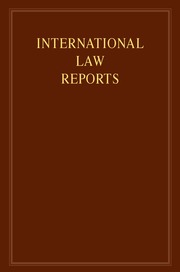No CrossRef data available.
Article contents
Asylum Legislation (Safe Third Countries) Constitutionality Case
Published online by Cambridge University Press: 01 January 2021
Abstract
Aliens — Refugees — Right to asylum on grounds of political persecution — Exceptions — Safe third country rule — Geneva Convention relating to the Status of Refugees, 1951 — Whether any binding rules under international law laying down minimum procedural requirements for determination of refugee status — Persons arriving from safe third countries — Automatic exclusion from right to asylum — Constitutional designation of all European Community Member States as “safe” — Provision for legislative designation of other third States as “safe” on condition that application of European Convention on Human Rights, 1950, and Geneva Refugee Convention, 1951, assured — Conclusive presumption that individual will be safe in designated “safe” States on basis of “normative certification” — Exclusion of examination on individual case-by-case basis — Exceptions only where compelling factual evidence of specific unusual risk to individual in third country concerned, sudden change of circumstances there or systematic infringement of principle of non-refoulement — Whether safe third country rule compatible with Federal German Basic Law
Aliens — Refugees — Non-refoulement — Primacy of international agreements over national law — Development of new international system of protection based on burden-sharing between participating States — Safe third country rule — Compatibility with principle of non-refoulement — Scope of principle of non-refoulement — Whether prohibiting deportation to State where individual at risk of onward deportation to persecuting State — The law of the Federal Republic of Germany
Keywords
- Type
- Case Report
- Information
- Copyright
- © Cambridge University Press 2007




